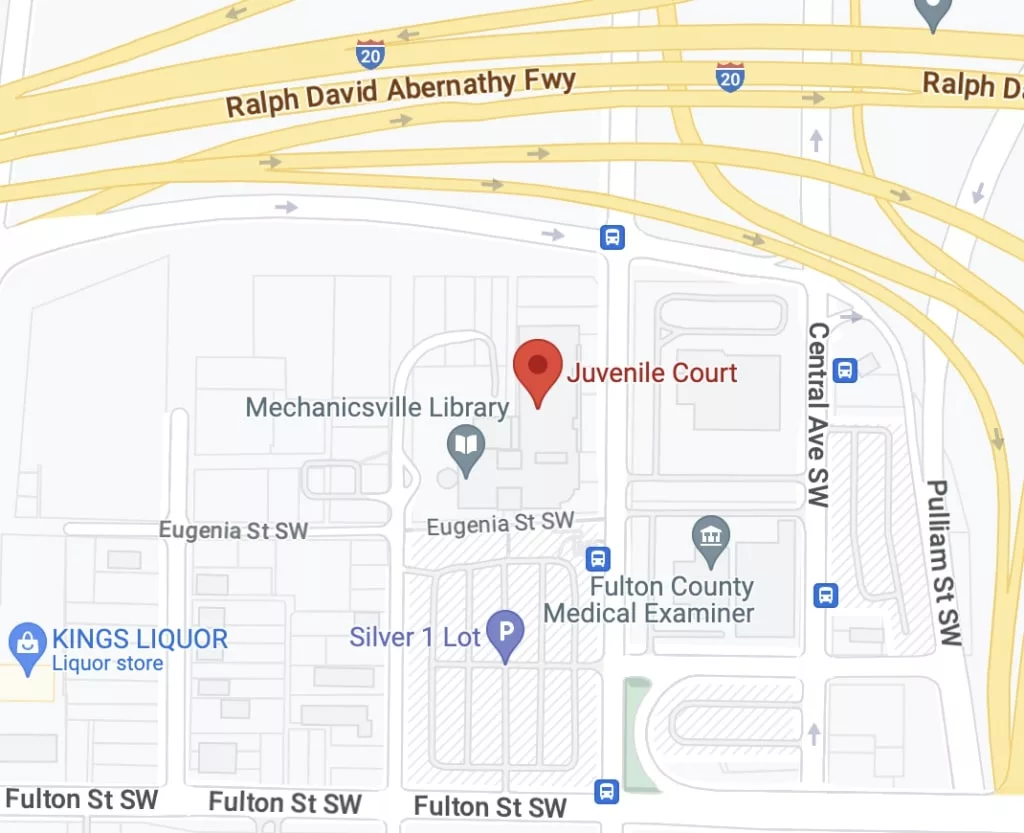Fulton County Juvenile Court is located in the Judge Romae T. Powell Juvenile Justice Center
at 395 Pryor St. SW, Atlanta, GA 30312.
Court Rules & Guidelines
Facemasks are encouraged in our premises.
If you don’t have one, the Fulton County Sheriff’s Office can provide you with a disposable mask when entering the building.
Vulnerable Persons who are not able to appear for a scheduled hearing could potentially be accommodated by being given the opportunity to access the hearing via video conferencing.
Courtroom Manners
The courtroom (“Courtroom” means the room in which a judge will conduct a court proceeding and the areas immediately outside the courtroom entrances or any areas providing visibility into the courtroom. Rule Juv 13.1(b)) is a place of order and structure. You should act in a respectful manner when in the presence of the judge, court staff, attorneys, court officers and other persons attending court. Once the court has made a ruling in your case, continue to be respectful as you exit the courtroom. Attempts to disrupt the court once the judge has made a ruling could result in your being held in contempt (which could include jail time and/or a fine).
Dress Code
If you are appearing in court you should dress appropriately and in a manner that shows respect for the court.
Here are some things you should not wear:
- Hats or other head coverings inside the courtroom (except those worn for religious or medical purposes)
- Sunglasses
- T-shirts depicting violence, sexual acts, profanity, or illegal drugs
- Tube or halter tops/plunging necklines/bare midriffs
- Ripped or torn jeans
- Miniskirts or shorts
- Baggy pants that fall below the waist
- Muscle shirts (usually worn as undergarments)
- If you are not dressed properly, you may be asked to leave the court and return at a later date. This will delay your hearing and require you to appear in court more than once.
When Appearing in Court
- Be on time
- Throw away gum, food, and drinks before entering the courtroom
- Stand when the judge enters and leaves the courtroom
- Stand when you are speaking to the judge
- Speak clearly when you respond to the judge’s questions
- Always address the judge as “Your Honor”
- Never interrupt the judge. If you are unsure of what you heard, wait until the judge or other person speaking has finished talking before asking a question
- Enter and leave the courtroom quietly so you do not disturb others
- Only approach the bench when instructed to do so
Parking
Parking is available in the lot located in front of the Juvenile Justice Center. The lot is accessible from Pryor Street Southwest, Fulton Street Southwest and Formwalt Street Southwest. The Juvenile Justice Center can also be reached by public transportation via MARTA Bus Route 49.
Court Hours and Holidays
Fulton County Juvenile Court is open for business on the following days:
Mondays: 8:30 a.m. – 5 p.m.
Tuesdays: 8:30 a.m. – 5 p.m.
Wednesdays: 8:30 a.m. – 5 p.m.
Thursdays: 8:30 a.m. – 5 p.m.
Fridays: 8:30 a.m. – 5 p.m.
In 2025, Juvenile Court will be closed for the following holidays:
New Year’s Day: Wednesday, January 1, 2025
Martin Luther King Jr. Day: Monday, January 20, 2025
President’s Day: Monday, February 17, 2025
Memorial Day: Monday, May 26, 2025
Juneteenth: Thursday, June 19, 2025
Independence Day: Friday, July 4, 2025
Labor Day: Monday, September 1, 2025
Veterans Day: Tuesday, November 11, 2025
Thanksgiving: Thursday, November 27, 2025
Friday after Thanksgiving: Friday, November 28, 2025
Christmas Day: Wednesday, December 24, 2025 and Thursday, December 25, 2025
New Year’s Eve: Wednesday, December 31, 2025
Virtual Appearances
All attorneys, clients, family members, and witnesses are expected to appear over Zoom as if they are in-person. Meaning that they should be clothed appropriately for court proceedings, able to be seen and heard, able to utilize the Zoom functions to change their name from the device, (i.e. “Apple iPhone”) to their correct name, have a stable internet connection, have a stationary device, be in a stationary position (specifically not driving), and able to appear visually for the entire hearing. If anyone appears virtually and does not follow those guidelines, the case may be reset to an in-person hearing and there may be in-person hearings for all hearings going forward. A practice session is recommended to ensure the party or witness is able to proceed without issue over Zoom, and if it becomes apparent that a party or witness is not able to appear over Zoom due to their own technical issues, the party/witness may request that the hearing be converted to an in-person hearing to avoid any further delay in the proceedings.
Security
The Judge Romae T. Powell Juvenile Justice Center is a secure facility. All persons entering the building will be required to pass through a metal detector and have hand-carried objects scanned. Weapons of any kind and cameras are not permitted into the building. Filming with cell phone cameras is prohibited. For a complete listing of prohibited items, please see the ‘Building Security’ page.
Use of Electronic Devices for Non-Recording Purposes
Pursuant to GA Uniform Juvenile Court Rule 13.1 the use of electronic devices, including mobile phones and computers, in a courtroom for purposes other than recording sounds and images (“Recording” means electronically or mechanically storing, accessing, or transmitting sounds or images. “Record” means to electronically or mechanically store, access, or transmit sounds or images, including by photographing, making an audio or video recording, or broadcasting. Nothing in this rule prohibits making written notes and sketches pertaining to any judicial proceedings.), is generally allowed by lawyers, employees of lawyers, and self-represented parties. Use of electronic devices is generally prohibited by witnesses, parties, and spectators, including representatives of the news media. Such persons may, however, use their devices by stepping outside the courtroom. Nothing in this rule prevents a judge from permitting parties and spectators to use their devices for non-recording purposes as the judge may allow in his or her discretion. Rule Juv-13.1(a) Any allowed use of electronic devices may be terminated by the judge, if such activity is disruptive, distracting or is otherwise contrary to the administration of justice.
Attorneys and their employees such as paralegals and investigators may use recording devices (“Recording device” means a device capable of electronically or mechanically storing, accessing, or transmitting sounds or images. The term encompasses, among other things, a computer of any size, including a tablet, a notebook, and a laptop; a smart phone, a cell phone or other wireless phone; a camera and other audio or video recording devices; a personal digital assistant (PDA); and any similar devices.) in a courtroom for non-recording purposes, including word processing, storing or retrieving information, accessing the internet, and sending or receiving messages or information. Self-represented parties may do the same but only in direct relation to their proceedings. Recording devices must be silenced and may not be used to make or receive telephone calls or for other audible functions without express permission from the judge. Rule Juv-13.1(d)(2)
Use of Electronic Devices to Record Judicial Proceedings
Open courtrooms are an indispensable element of an effective and respected judicial system. It is the policy of Georgia’s courts to promote access to and understanding of court proceedings not only by the participants in them but also by the general public and by news media who will report on the proceedings to the public. This must be done, however, while protecting the legal rights of the participants in the proceedings and ensuring appropriate security and decorum. Rule Juv-13.1(a)
Except as otherwise required by law, GA Uniform Juvenile Court Rule 13.1 governs the use of devices to record sounds or images in a courtroom and comports with the standards provided in O.C.G.A. § 15-1-10.1 regarding the use of devices to record judicial proceedings. Rule Juv -13.1(a)
Attorneys, Employees of Attorneys Such as Paralegals and Investigators, and Self-Represented Parties (Pro Se Litigants)
Unless otherwise ordered by the court, attorneys representing parties in a proceeding and self-represented parties may make audio recordings of the proceeding in a non-disruptive manner after announcing to the court and all parties that they are doing so. Recordings made pursuant to this paragraph may be used only in litigating the case or as otherwise allowed by the court or provided by law. Attorneys and self-represented parties may also seek authorization to record proceedings pursuant to paragraph (e) of Rule 13.1. Any allowed use of a recording device is subject to the authority of the judge to terminate activity that is disruptive or distracting or is otherwise contrary to the administration of justice. Rule Juv-13.1(d)(1)
Witnesses, Parties, and Spectators, Including Representatives of the News Media
The following restrictions apply to use of recording devices by witnesses, by parties, and by spectators, including representatives of the news media:
Witnesses
Witnesses shall turn the power off to any recording device while present in a courtroom and may use a device while testifying only with permission of the judge. Witnesses shall not record proceedings. Rule Juv-13.1(c)(1)
Parties and Spectators
Parties and spectators may use recording devices to record proceedings only as specifically authorized by the court pursuant to this rule. All parties and spectators shall turn the power off to any recording device while present in a courtroom, unless the judge allows orally or in writing the use of recording devices in the courtroom for purposes other than recording sounds and images, which the judge may freely do when he or she believes such use would not be disruptive or distracting and is not otherwise contrary to the administration of justice. When such use is allowed, recording devices must be silenced and may not be used to make or receive telephone calls or for other audible functions without express permission from the judge. Rule Juv-13.1(c)(2)
Denial and Limitations of Recording
Denial of Recording
A judge may deny a request if the proceeding is a closed proceeding as outlined in O.C.G.A. § 15-11-700 et seq. of the Juvenile Code. If the proceeding is open to the general public, a judge may deny a request for recording only after making specific findings on the record that there is a substantial likelihood of harm arising from one or more of the following factors, that the harm outweighs the benefit of recording to the public, and that the judge has considered more narrow restrictions on recording than a complete denial of the request:
- The nature of the particular proceeding at issue
- The consent or objection of the parties, witnesses, or alleged victims whose testimony will be presented in the proceedings
- Whether the proposed recording will promote increased public access to the courts and openness of judicial proceedings
- The impact upon the integrity and dignity of the court
- The impact upon the administration of the court
- The impact upon due process and the truth finding function of the judicial proceeding
- Whether the proposed recording would contribute to the enhancement of or detract from the ends of justice
- Any special circumstances of the parties, witnesses, alleged victims, or other participants, such as the need to protect children or factors involving the safety of participants in the judicial proceeding
- Any other factors affecting the administration of justice or which the court may determine to be important under the circumstances of the case (Rule 13.1(g)(1)).
Limitations of Recording
Upon his or her own motion or upon the request of a party, witness, or alleged victim, a judge may allow recording as requested or may, only after making specific findings on the record based on the factors in the preceding paragraph, impose the least restrictive possible limitations such as an order that no recording may be made of a particular criminal defendant, civil party, witness, alleged victim, law enforcement officer, or other person, or that such person’s identity must be effectively obscured in any image or video recording, or that only an audio recording may be made of such person. Rule 13.1(g)(2)


